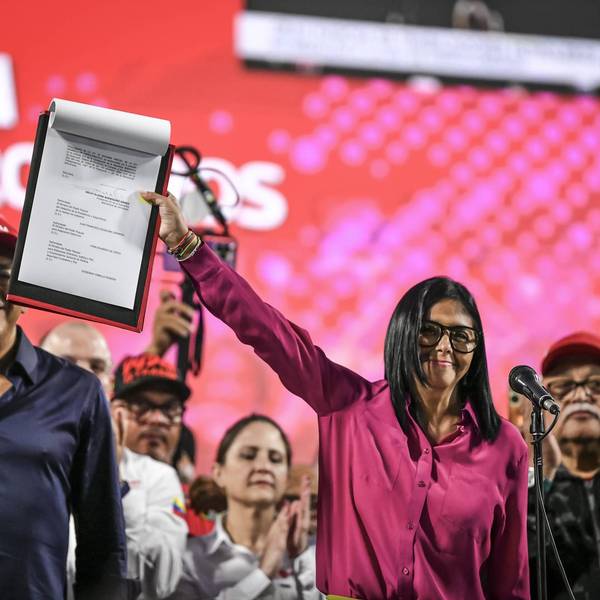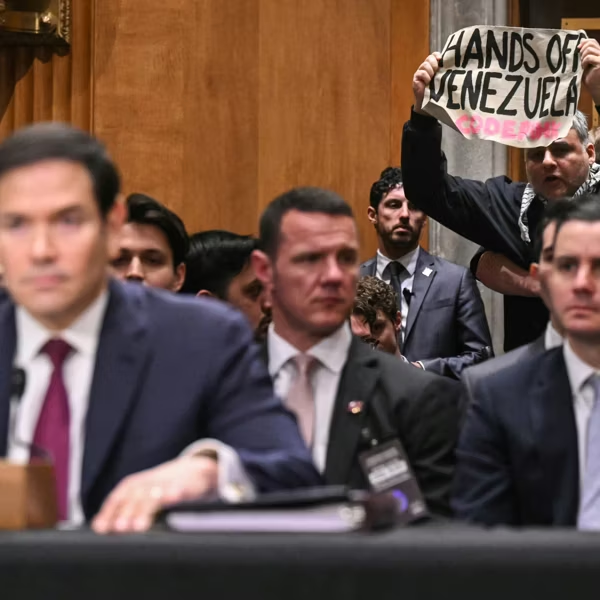In the latest sign of rising tensions between the United States and Venezuela, President Barack Obama on Monday issued and signed an executive order declaring the Latin American country "an unusual and extraordinary threat to the national security" and ordering sanctions on seven state officials.
Justifying its mandate, the executive order cites alleged "erosion of human rights guarantees, persecution of political opponents, curtailment of press freedoms, use of violence and human rights violations and abuses in response to anti-government protests, and arbitrary arrest and detention of anti-government protestors, as well as the exacerbating presence of significant public corruption."
Relations between the two countries "are currently in tatters," as NPR puts it.
Congress passed legislation late last year authorizing penalties that would freeze the assets and ban visas for anyone accused of carrying out acts of violence or violating the human rights of those opposing Venezuela's government. State officials said those sanctions were politically motivated.
In December, Venezuelan President Nicolas Maduro--who has accused the U.S. of helping plot a coup against him--denounced the sanctions and told a crowd of supporters in Caracas that recent police killings in New York and Ferguson were a sign that the U.S. was becoming an "imperialist police state."
Just last week, the Venezuelan government gave the U.S. two weeks to cut 80 of the 100 diplomats it has in the country and imposed new travel bans. Former U.S. President George W. Bush and former Vice President Dick Cheney are just two of the names included on a list of U.S. citizens now ineligible for Venezuelan visas.
But these developments are part of a familiar narrative, writes Sonali Kolhatkar, host and executive producer of the daily radio show Uprising: "The backdrop to these political moves is a new crisis within Venezuela that has an old script: right-wing leaders plan a coup, with the U.S. deeply implicated; wealthy protesters take to the streets; and the Western media cover both stories with great sympathy while openly mocking the democratically elected government for attempting to defend itself.
Kolhatkar continues:
The U.S. has long been involved in attempts to destabilize Venezuela's socialist government. Its role in the 2002 coup against Hugo Chavez is well-documented. Over the years, many organizations, including ones in which right-wing opposition figures are involved, have received funding from the likes of USAID and the National Endowment for Democracy (NED), both U.S.-based agencies notorious for fomenting unrest in countries hostile to U.S. interests. For example, Machado headed an organization named Sumate that has received funding from the NED.
U.S. officials have also made no secret about their hostility to Venezuela. Last year the Obama administration imposed sanctions on a number of Venezuelan officials it claims are implicated in human rights abuses and corruption, although it is keeping the list of names secret. In President Obama's 2015 National Security Strategy, he announced that the U.S. would "stand by the citizens of countries where the full exercise of democracy is at risk, such as Venezuela."
Despite this documentation of American animosity toward Venezuela, media outlets continue to harbor an inexplicable blind spot on the U.S. role.
In fact, Kolhatkar asserts: "Media coverage of Venezuela is so skewed that even the contentious issue of the Israeli-Palestinian conflict seems to generate fairer coverage these days."
A full list of the sanctioned Venezuelan officials can be found at the Guardian.



